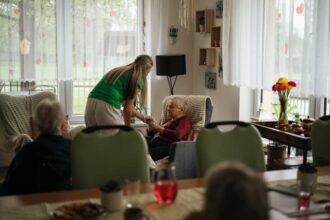During a pandemic, the focus often shifts towards immediate challenges such as disease management, safety assurance, and disruption of daily routines. Despite the difficulties posed by adversity, it can occasionally catalyse positive outcomes.
Research concerning the impact of COVID-19 and associated regulatory measures on older adults in retirement communities, mainly, has been sparse. Furthermore, investigations into potential positive outcomes for this demographic have been similarly limited.
A novel study involving 98 older adults with a median age of 86 years residing in a South Florida continuing-care retirement community during the pandemic has shed light on how this group recovered from adversity and derived strength from their challenging experiences. This research, undertaken by the Florida Atlantic University’s Christine E. Lynn College of Nursing, was guided by the “post-traumatic growth” theory framework and published in the Journal of Gerontological Nursing.
Post-traumatic growth theory, a psychological concept, describes the beneficial transformations individuals may experience when they grapple with severe life challenges. According to Lenny Chiang-Hanisko, PhD, the senior author and an associate professor at FAU’s College of Nursing, while traumatic events like pandemics can cause considerable distress and difficulties, they also present an opportunity for significant personal development in some individuals.
Despite the fear and stress induced by the pandemic, this study’s findings reveal significant personal growth for many participants. The disruption of regular activities, such as walking with friends or engaging in dinner conversations, led some to discover new hobbies like gardening and painting. In contrast, others found innovative ways to remain active through virtual yoga, online gaming, and dancing—the extended time spent at home allowed many to delve into their creative pursuits.
Chiang-Hanisko noted that post-traumatic growth could facilitate the discovery of new possibilities, the reassessment of life’s objectives, and the pursuit of new endeavours. This growth often manifests as stronger interpersonal relationships, enhanced resilience and self-confidence, deeper spiritual connections aligned with life’s purpose, and an increased appreciation of life, prompting a shift towards prioritising a fulfilling existence.
The study also highlighted that participants deepened their relationships with family and friends through video calls, maintaining connections despite physical distancing. Drawing on their life experiences, which included previous adversities like recessions and wars, they managed to navigate the challenges of the pandemic. This period also fostered spiritual and reflective growth, with many finding comfort in online religious services and appreciating a slower pace of life. The lack of physical interaction with loved ones underscored the importance of such relationships and led to a heightened appreciation for life’s simpler joys. A daily focus on gratitude helped them to concentrate on the positive aspects and manage the difficulties encountered.
Patricia Liehr, PhD, co-author and interim dean at FAU’s College of Nursing, highlighted that the study participants’ experiences demonstrated their inner strength and adaptability in the face of health challenges. She remarked that their age gave them the perspective necessary to understand that difficult times are generally temporary and that it is feasible to find joy and meaning even amidst hardship.
Despite facing barriers, participants adapted by incorporating technological skills into their daily routines, thus underscoring their openness to new methods of managing their lives. Following insights from the study, Chiang-Hanisko advocated for policy reforms to ensure that individuals of all ages have access to and training in user-friendly internet and digital services.
The study also exposed challenges like social isolation, managing pandemic-related restrictions, and emotional difficulties like loneliness. Restrictions in communal dining areas significantly curtailed social interactions and were a significant source of frustration. Despite these problems, the health of 86% of participants did not deteriorate, and they were all vaccinated. A majority supported the community’s pandemic precautions, though over half reported psychosocial challenges, including anxiety and depression.
The researchers formulated a survey with open-ended questions to delve deeper into the personal impacts of the pandemic, such as the most challenging effects experienced, strategies employed to manage these effects, and critical personal revelations during this period.
The pandemic has underscored the necessity for flexible, safe, and socially engaging living arrangements for older adults that meet their needs and contribute to their ongoing personal development. This has paved the way for potentially new living configurations anticipating future pandemics.
More information: Lenny Chiang-Hanisko et al, COVID-19 Pandemic and Posttraumatic Growth in Residents of a Continuing Care Retirement Community: A Mixed Methods Study, Journal of Gerontological Nursing. DOI: 10.3928/00989134-20240503-01
Journal information: Journal of Gerontological Nursing Provided by Florida Atlantic University








